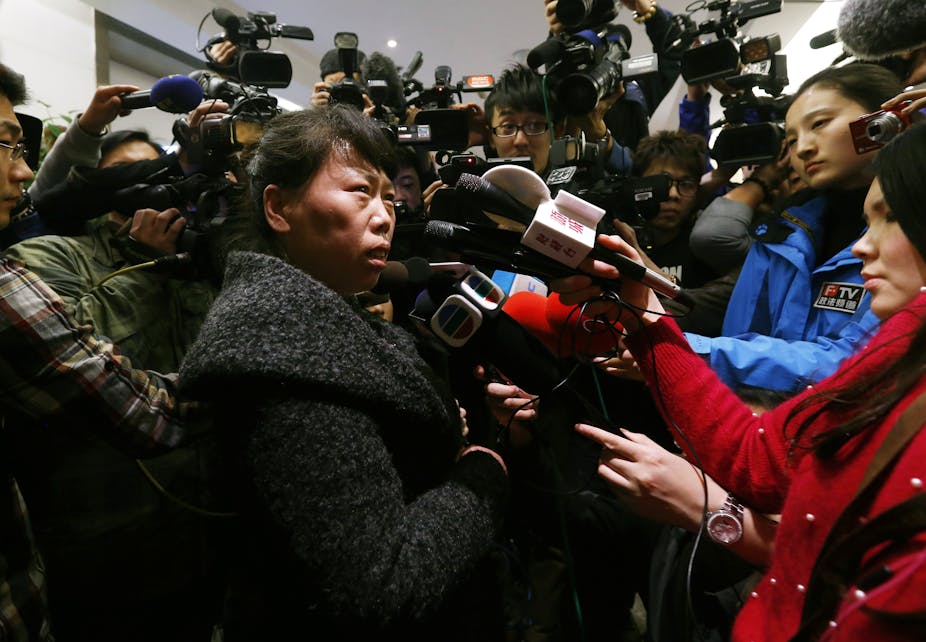Chinese media coverage of the missing flight MH370 is acting as a proxy for the country’s positioning as a rising diplomatic power with expansionary ambition in the Asian-Pacific.
Since the flight was announced as lost in the Indian Ocean, the Chinese media have laid the blame on the Malaysian authorities. The home minister of Malaysia said it was the Chinese language papers and print media’s coverage of the crisis that led to massive criticism and anger from Chinese relatives against Malaysia.
Another Malaysian politician, Datuk Bung Mokhtar Radin even suggested the Malaysian government must restrict information on the internet to calm down the Chinese.
China’s contribution to the complex search for the missing plane has been confirmed by the fact that it was a Chinese ship that picked up a quasi signal that might be consistent with the plane’s black box. This information has been heavily reported by Chinese mainstream media and reposted by millions on Chinese social media like microblog and Wechat.
After Malaysia’s police chief warned on 2 April that the plane mystery may never be solved, Chinese state media CCTV broadcast the phone dialogue between Chinese premier Li Keqiang and Australian prime minister Tony Abbott.
Xinhua and People’s Daily have also continuously provided up-to-date reports to emphasise the governments efforts, but emphasising tolerance. “The national emotion release needs to be rationally expressed,” wrote the People’s Daily on 3 April .
In contrast, the market-oriented newspapers in China, as opposed to those that are state-owned, have urged truth and transparency on MH370 via their front pages. Chinese audiences, especially social media users, have expressed mistrust and impatience against the “confused and contradictory statements” from the Malaysian authorities – insisting that a statement of “ending” without finding the plane itself is nothing but suspense. Even the official microblogs of CCTV and People’s Daily online have appealed for the evidence and truth about the vanished flight to come out.
Flexing muscles
The continuous coverage by Chinese media is not only driven by the aims of news outlets to report the truth, but also encouraged by the rescue actions of the Chinese government. Compared with the “cold treatment” of the Manila hostage crisis that occurred in the Philippines in 2010, the role the Chinese government has played this time is more appreciated by its people.
In the Manila hostage crisis, the Philippine officials’ poor handling of the situation was investigated as the cause of the deaths of eight Hong Kong-Chinese hostages. While the Hong Kong Government issued a “black” travel alert for the Philippines as a result of the unresolved affair, the Chinese government was accused of dereliction of duty as they only put out a muted response, which was criticised in the Chinese media as “weak state diplomacy”.
This time, the demands from the Chinese media for the Malaysian government to release accurate information are relatively confident and powerful. China’s military power has been one of the main focuses of the country’s media since the Chinese Coast Guard 3411 ship was sent to the South China Sea to look for the missing plane.
The search operation for MH370 is the first time China has joined a multinational military search and rescue in foreign waters. This has been warmly greeted by the Chinese population who are impressed at their country’s improving national defence capability and China’s growing international status as a rising power that values its people’s lives.
After the reported data brought by 21 Chinese satellites and more than ten aircrafts and ships, many netizens’ posts and comments have shown a strong sense of national pride reflecting a shift from the humble mentality of a weak nation to the dignified attitude of a world power.
Very soft power
But the soft power exercised by Chinese media outlets has been rather weak if we carefully analyse their performance on reporting MH370. The first Chinese media coverage of the missing aircraft was translated from CNN. In the following days, nearly all the updated online information by Chinese media has been from mainstream Western news agencies, like BBC, CNN, and Reuters.
The reports by Chinese media have been relatively mediocre in quality and hysterical in tone, betraying a lack of resources for foreign stories and inexperience in competing with international media organisations.
What’s more, as Facebook and Twitter are blocked in China, the social media users in China have had to rely on the native Chinese news outlets to obtain convincing information, which makes the whole discussion on MH370 more chaotic and less efficient. For example, the angry slogan on Chinese media by celebrities calling for boycotts against Malaysia reflects the sentimentality and immaturity of many Chinese netizens.
From Chinese media coverage on MH370, it appears that China’s diplomatic approach has shifted from: “hide our capabilities and bide our time” to “show up”.
However, the competitiveness embodied by this diplomatic shift hasn’t been matched by the Chinese media which has failed to meet the information demands of audiences in China. Both China’s media and its audiences still need a lot of development before they can reflect the rationality and dignity expected in a world power.

